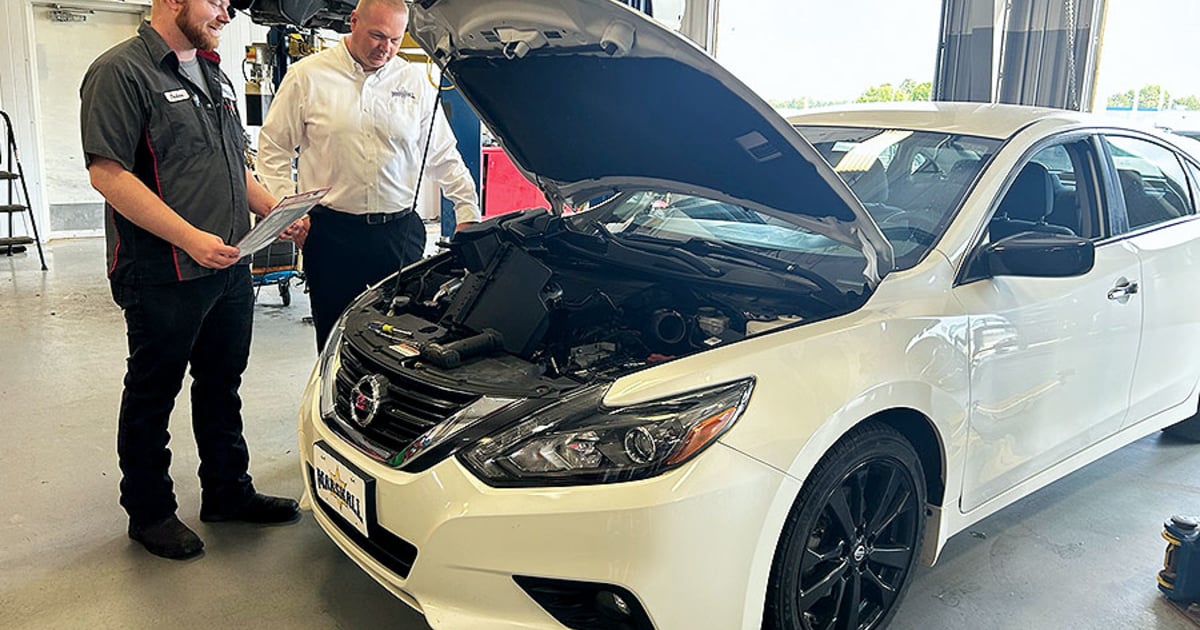
For one small franchised dealership group in Kansas, completing the steps to certify every used vehicle — within reason — has proved to be a timely and helpful venture.
Marshall Motor Co., of Salina, Kan., aims to factory-certify all used-vehicle inventory that qualifies. The group, which has Chrysler-Dodge-Jeep-Ram and Nissan storefronts, had certified some Chrysler used-vehicle inventory since 2004. But the particular practice in focus here has been in place since May 2017, when Randall McCoy, used-car manager at the time, advocated for it. McCoy is now retired.
General Manager Jason Stroda said the dealerships look at certifying any used Chrysler, Dodge, Jeep, Ram and Nissan vehicles, most of which are five model years old or newer and don’t have more than 75,000 miles on the odometer. The reasons: to capitalize on the value of those vehicles and to differentiate Marshall from other used-vehicle dealerships in the region that don’t have a certification program or don’t have a larger selection of certified used vehicles.
“That’s how we separate ourselves,” Stroda told Automotive News. “That was the main reason [for launching the practice]. You could buy a Dodge Journey from a used-car shop for $20,000, or you can buy ours that’s been certified for $21,000. You get a warranty. It’s been through a certified process.”
In 2022, Marshall Motor Co. sold 405 new vehicles and 650 used vehicles. It sold an average of 22 certified vehicles a month last year, Stroda said.
Year to date, about 55 percent of certified vehicles in Marshall’s inventory turn within the first 30 days, Stroda said. That’s up from a turn rate of roughly 31 percent in 2022, he said.
It proved fortuitous that the certification program was in place well ahead of the new-vehicle scarcity in 2020 and 2021 that caused inventory problems. Customers who couldn’t get a new vehicle of their choice began considering the next option, Stroda said: younger used vehicles with plenty of pep and pickup left in them.
“I’d like to say [our increase in certified turn] was because of our practices and our processes, but I would mainly say it’s market demand,” he said. “There were no new cars, so our certified sales really did increase.”
Through the program, Marshall is trying to grow awareness of certified vehicles.
“I started selling cars 20 years ago,” Stroda said. “Twenty years ago, you had to educate the customer on what you had and your why-buys. Now, a customer comes in and they’ve already done their homework.”
Customers are indeed getting better at knowing a manufacturer’s certification requirements, Stroda said. And they “know what they’re paying the extra money for,” such as a warranty or roadside assistance, Stroda said.
Marshall’s service and parts and finance departments benefit from the practice, too.
Employees try to acquire vehicles they know can be certified with little issue. Those are often gleaned from wholesale auctions and trade-ins by customers who leased a new vehicle. Trade-ins, Stroda said, are “typically the best ones” for certification.
A service technician gets paid an extra half-hour’s time to conduct a more thorough 125-point inspection on a vehicle that’s up for certification, Stroda said.
“Typically, they all get new tires,” Stroda said. “Brakes have to be at half [brake pad life] or better because the last thing you want to do is sell someone a vehicle that says it’s been inspected, bring it back in, and the brakes are worn out in the first 3,000 miles.”
The lengthier inspection sets a certified vehicle apart from other vehicles that are reconditioned, Stroda said.
“You want to do a quality inspection because your price [is at the] top end of the market,” he said.
The certification program is also fruitful for Marshall’s finance department: 70 percent of certified-vehicle buyers will sign up for an extended service contract, Stroda said.
For certified vehicles 5 years old or younger with less than 75,000 miles, that service contract covers seven years from the date the vehicle was originally sold or when it reaches 100,000 miles on its odometer, whatever comes first.